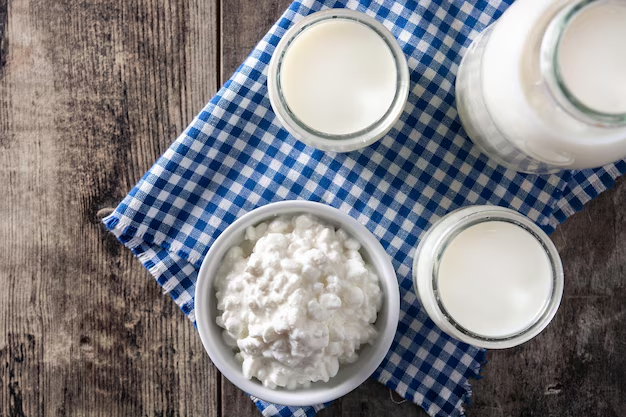Fermented foods have been part of human diets for thousands of years and are now making a strong return in modern kitchens. These foods are valued not only for their taste but also for their many health benefits. From sauerkraut to yogurt and kimchi, people are rediscovering the value of these traditional foods.
Fermentation is a natural process where tiny organisms like bacteria, yeast, or mold break down parts of the food—mainly sugars and starches—into simpler substances. This process creates acids, gases, or alcohol, which help preserve the food and give it its signature tangy flavor.
Beyond preservation and flavor, fermentation also improves a food’s nutrition. It increases the availability of certain vitamins, enhances digestion, and promotes the growth of healthy gut bacteria. With so many benefits and a growing interest in gut health, it’s easy to see why fermented foods are once again becoming a popular part of everyday meals.
In this article, we will explore the world of fermented foods, their health benefits, the science behind fermentation, and a list of the top 8 fermented foods you should try for better health and vitality.
What is Fermentation ?
Fermentation is a natural metabolic process that has been used for centuries to make and preserve food. It plays a vital role in creating many of the delicious and nutritious foods we enjoy today. This process is especially important in producing fermented foods like yogurt, kimchi, sauerkraut, and kombucha.

In fermentation, tiny living organisms such as bacteria or yeast break down sugars in food. What makes this process unique is that it happens without the presence of oxygen. As the microorganisms consume the sugars, they produce by-products such as acids, gases, or alcohol, depending on the type of fermentation.
These by-products help preserve the food and give it a distinct flavor and texture. For example, the sour taste in many fermented foods comes from the natural acids formed during the process. This is what makes fermented products so unique and enjoyable.
Fermented foods are also known for their health benefits. They can support better digestion, improve gut health, and increase nutrient absorption in the body.
This process is carried out by bacteria, yeasts, or molds, and it serves multiple purposes, such as:
Preservation: Fermentation helps prolong the shelf life of foods by creating an environment that inhibits harmful bacteria and pathogens.
Enhanced Nutritional Value: The fermentation process can increase the bioavailability of nutrients, making them easier for the body to absorb.
Digestive Health: Fermented foods are often rich in probiotics, which are beneficial bacteria that promote gut health.
Improved Taste and Texture: Fermentation imparts distinctive sour, tangy, and umami flavors to foods, while also modifying their texture.
Fermentation is often associated with ancient cultures—whether in the form of sauerkraut in Europe, kimchi in Korea, or miso in Japan. Today, fermented foods have gained immense popularity for their numerous health benefits, particularly for gut health and immune system function.
Health Benefits of Fermented Foods
Fermented foods are celebrated for their health-enhancing properties. Here are some of the top health benefits that fermented foods can provide:
Support Digestive Wellness: Fermented foods are rich in probiotics, which are live beneficial bacteria and yeasts that play a key role in maintaining a healthy digestive system. When consumed regularly, these probiotics help keep the gut microbiota in balance—the diverse community of microbes living in your intestines. A well-balanced gut environment can reduce common digestive discomforts like bloating, constipation, and symptoms related to irritable bowel syndrome (IBS).
Strengthen the Immune System: A large part of your immune system is located within the gut. By improving gut flora through the intake of fermented foods, you can also boost your body’s defense mechanisms. The probiotics found in these foods stimulate the creation of essential immune cells, helping the body respond better to infections and improving long-term immune resilience.

Enhance Nutrient Bioavailability: The fermentation process breaks down complex components such as phytic acid and fiber, which can otherwise block nutrient absorption. This transformation increases the bioavailability of vitamins, minerals, and antioxidants in fermented foods, allowing your body to absorb and use these nutrients more effectively for improved overall health.
Support Mental and Emotional Balance: There is growing scientific evidence linking gut health to brain function, known as the “gut-brain axis.” Fermented foods can contribute positively to mental well-being by supporting a healthier gut microbiome. Certain fermented options like yogurt and kimchi contain compounds that may help reduce anxiety, ease stress, and even promote a more stable mood.
Aid in Natural Detoxification: Fermentation can naturally reduce harmful substances found in raw foods. Through this process, toxins and anti-nutrients such as lectins in legumes and phytic acid in grains are broken down, making fermented foods safer, easier to digest, and less likely to trigger digestive issues. This detoxifying effect supports better digestive health and nutrient absorption.
The Top Fermented Foods to Try
There are hundreds of fermented foods around the world, each offering unique flavors, textures, and health benefits. Below are eight of the most popular and widely loved fermented foods that you should consider incorporating into your diet.
Kimchi

Kimchi is a well-known traditional Korean dish that is enjoyed around the world. It is made by fermenting vegetables, most commonly napa cabbage and radishes, with a flavorful mix of chili pepper, garlic, ginger, and fish sauce. The fermentation process gives it a tangy, spicy taste and extends its shelf life naturally.
As one of the most popular fermented foods, kimchi is packed with health benefits. It is a natural source of probiotics, which support healthy digestion and help balance the gut microbiome. These live bacteria develop during the fermentation process and are known to improve gut health.
In addition to probiotics, kimchi is rich in important nutrients like vitamins A and C. These vitamins support immune function and skin health. Including kimchi and other fermented foods in your meals can be a delicious way to enhance both flavor and wellness.
Health Benefits:
Contains beneficial bacteria like Lactobacillus that support gut health.
May aid digestion and reduce bloating.
High in fiber and antioxidants, which support overall health and inflammation reduction.
How to Eat It: Kimchi can be enjoyed on its own, mixed into rice dishes, or used as a side dish with grilled meats.
Sauerkraut
Sauerkraut is a popular type of fermented food made by finely chopping cabbage and mixing it with salt. The cabbage is then packed tightly and left to ferment for several weeks. During this time, natural bacteria break down the sugars in the cabbage, creating a sour and tangy flavor.
Although sauerkraut is best known as a traditional German dish, it has been enjoyed in many European countries for centuries. Each region may add its own twist, but the basic process remains the same—using fermentation to preserve and enhance the flavor of cabbage.
As one of the classic fermented foods, sauerkraut is rich in probiotics that support gut health. It also contains fiber, vitamin C, and beneficial plant compounds. Adding sauerkraut to your meals is a simple way to enjoy the benefits of fermented foods while adding a flavorful crunch to your plate.
Health Benefits:
High in probiotics that can promote digestive health.
Rich in vitamin C, which supports immune function.
May help regulate cholesterol levels and improve heart health.
How to Eat It: Sauerkraut can be added to sandwiches, sausages, or mixed into salads. It can also be paired with meats like pork for a tangy, flavorful dish.
Kefir

Kefir is a creamy, tangy fermented milk drink that has a thinner texture than yogurt. It is made by adding kefir grains—small clusters of beneficial bacteria and yeasts—to milk. These grains kick off the fermentation process, turning the milk into a probiotic-rich beverage.
As one of the widely consumed fermented foods, kefir is known for its high probiotic content, which helps support digestive health. The good bacteria and yeasts in kefir can help balance the gut, making it easier for the body to break down food and absorb nutrients.
Kefir also provides calcium, protein, and B vitamins, making it a nutritious option for daily consumption. Its mild flavor and smooth texture make it easy to enjoy on its own or added to smoothies, cereals, or salad dressings. Including kefir and other fermented foods in your diet can contribute to better gut and overall health.
Health Benefits:
Contains a variety of beneficial bacteria and yeasts, more diverse than those in yogurt.
Can help alleviate symptoms of lactose intolerance.
Supports gut health and strengthens the immune system.
How to Eat It: Kefir can be enjoyed as a drink on its own or used in smoothies, salad dressings, or even baked goods.
Miso
Miso is a traditional Japanese paste made by fermenting soybeans with salt and a specific type of fungus called Aspergillus oryzae. This process creates a thick, savory paste that is rich in flavor and commonly used in soups, sauces, and marinades across Japanese cuisine.
As a staple among fermented foods, miso offers more than just taste. The fermentation process gives it a unique umami flavor while also enhancing its nutritional profile. Miso contains beneficial bacteria that can support gut health, along with important nutrients like protein, vitamins, and minerals.
Because of its strong, salty flavor, a small amount of miso can add depth to many dishes. Whether stirred into a warm bowl of soup or used as a flavorful seasoning, miso is a delicious way to enjoy the benefits of fermented foods while exploring the richness of traditional Japanese cooking.
Health Benefits:
Rich in protein and vitamins like B vitamins and vitamin K.
Contains probiotics that support gut health and digestion.
Miso’s high salt content may help regulate blood pressure when consumed in moderation.
How to Eat It: Miso is most commonly used in miso soup but can also be incorporated into sauces, dressings, or stir-fries.
Yogurt

Yogurt is a creamy and nutritious food made by fermenting milk with beneficial bacteria like Lactobacillus and Bifidobacterium. These bacteria convert the natural sugars in milk into lactic acid, which thickens the milk and gives yogurt its slightly tangy flavor.
As one of the most popular fermented foods globally, yogurt is enjoyed in many cultures and forms—from plain varieties to fruit-flavored options. The live bacteria present in yogurt help promote a healthy gut by supporting the balance of good microbes in the digestive system.
In addition to probiotics, yogurt is also rich in calcium, protein, and B vitamins, making it a healthy addition to many diets. Whether eaten on its own, added to smoothies, or used in cooking, yogurt is a versatile and tasty way to enjoy the many benefits that fermented foods have to offer.
Health Benefits:
Rich in calcium and vitamin D, which promote bone health.
Contains probiotics that support digestion and immunity.
Can help reduce symptoms of irritable bowel syndrome (IBS).
How to Eat It: Yogurt is incredibly versatile—eat it plain, mix it with fruits, nuts, or granola, or use it as a base for smoothies and sauces.
Tempeh
Tempeh is a traditional fermented soybean product that comes from Indonesia. It is made by fermenting whole soybeans with a special type of mold, which binds the beans into a firm, compact block. This fermentation process gives tempeh a hearty texture and a nutty, earthy flavor.
As a unique member of the family of fermented foods, tempeh stands out for its high protein content and nutritional value. Unlike tofu, which is made from soy milk, tempeh uses the whole soybean, making it richer in fiber and nutrients. It also contains probiotics that support gut health.
Tempeh can be sliced, grilled, baked, or added to various dishes as a plant-based protein source. Its firm texture holds up well in stir-fries, sandwiches, and salads. Including tempeh and other fermented foods in your diet is a great way to enjoy flavorful meals while supporting digestive and overall health.
Health Benefits:
High in protein, making it a great meat alternative for vegetarians and vegans.
Rich in probiotics and fiber, which support digestive health.
Contains vitamins B2 and B12, which are essential for energy metabolism and nervous system function.
How to Eat It: Tempeh can be sliced and pan-fried, used in sandwiches, salads, or served as a meat substitute in stir-fries.
Pickles

Pickles, especially fermented ones, are a popular type of preserved food made by soaking cucumbers in a salty brine or vinegar and allowing them to ferment over time. This natural process creates a tangy, sour flavor and helps preserve the cucumbers for longer periods.
Fermented pickles are a staple in many Eastern European and Mediterranean cuisines, where they are often served as side dishes or snacks. Unlike quick pickles made only with vinegar, fermented pickles rely on beneficial bacteria to break down sugars and create lactic acid, which adds to their unique taste and health benefits.
As part of the group of fermented foods, pickles can be a good source of probiotics that support gut health and digestion. Including fermented pickles in your meals not only adds flavor and crunch but also introduces helpful bacteria into your diet, making them both tasty and nutritious.
Health Benefits:
Rich in probiotics that support gut health.
Can aid digestion and alleviate bloating.
Pickles made in brine may offer anti-inflammatory benefits.
How to Eat It: Enjoy pickles as a snack, on sandwiches, or alongside burgers and hot dogs.
Natto
Natto is a traditional Japanese dish made from fermented soybeans. Known for its strong smell and sticky, stringy texture, natto is a unique food that stands out in both appearance and taste. Despite its bold characteristics, it is widely consumed in Japan, especially as a breakfast item.
As one of the more distinctive fermented foods, natto is packed with health benefits. It contains a special enzyme called nattokinase, which may support heart health. Natto is also rich in protein, fiber, and vitamin K2—an important nutrient for bone and cardiovascular health.
While natto’s texture and aroma may take some getting used to, many people include it in their diet for its powerful nutritional value. Whether served over rice or mixed with sauces, natto is a valuable addition to the variety of fermented foods that promote overall wellness and gut health.
Health Benefits:
Rich in vitamin K2, which supports bone health.
Contains Bacillus subtilis, a probiotic that supports digestion.
High in protein and fiber, making it a great food for vegetarians.
How to Eat It: Natto is often served with rice, soy sauce, and mustard or mixed into soups and salads.

How to Include More Fermented Foods into Your Diet
Including fermented foods into your diet is easy and can be done in several ways:
| Tip | How to Use |
|---|---|
| Add kimchi to your meals | Mix kimchi with rice or use it as a sandwich topping for extra flavor. |
| Make smoothies with kefir | Use kefir as a base in place of yogurt or milk for a probiotic-rich smoothie. |
| Use sauerkraut as a topping | Add sauerkraut to hot dogs, burgers, or salads for a tangy twist. |
| Snack on yogurt or kefir | Enjoy yogurt or drink kefir as a healthy morning or midday snack. |
| Cook with miso | Stir miso into soups, sauces, or dressings to add rich umami flavor. |
| Try tempeh as a meat substitute | Use tempeh in stir-fries, sandwiches, or grain bowls for plant-based protein. |
| Enjoy fermented pickles | Serve pickles as a flavorful side dish or snack. |
| Experiment with natto | Eat natto with rice for a traditional Japanese-style meal experience. |
Conclusion
In conclusion, fermented foods are a powerful addition to any diet, offering a wealth of health benefits ranging from improved gut health to enhanced nutrient absorption. The fermentation process not only preserves food but also introduces beneficial probiotics that promote digestive wellness and boost immunity. From popular options like kimchi, yogurt, and sauerkraut, to nutrient-dense varieties like tempeh and natto, the world of fermented foods is diverse and packed with flavor.
By including fermented foods into your meals, you can enjoy better digestion, stronger immunity, and an overall healthier lifestyle. Whether you’re new to the concept or a longtime fan, it’s clear that fermented foods are an excellent way to nourish your body from the inside out. So, start exploring the incredible world of fermented foods and reap the benefits of this ancient yet modern food trend!
FAQs
Q.1 What are fermented foods ?
Fermented foods are foods that have undergone a process where bacteria, yeast, or molds break down the sugars and starches in the food. This process enhances the food’s shelf life, flavor, and nutritional profile. Common examples include kimchi, yogurt, sauerkraut, kefir, and tempeh.
Q.2 What are the health benefits of fermented foods ?
Fermented foods offer numerous health benefits, including improving gut health by promoting the growth of beneficial bacteria (probiotics). They also help in digestion, boost the immune system, improve nutrient absorption, and may even support mental health through the gut-brain connection.
Q.3 Can fermented foods help with digestion ?
Yes, fermented foods are known to aid digestion due to their probiotic content. The beneficial bacteria in these foods can help balance your gut microbiome, reduce bloating, and improve symptoms of digestive issues like IBS and constipation.
Q.4 Are fermented foods safe for everyone ?
In general, fermented foods are safe for most people. However, individuals with certain health conditions, like those with a compromised immune system or sensitivity to histamines, may need to consult a doctor before incorporating them into their diet. Fermented foods can be high in salt, so people with high blood pressure should consume them in moderation.
Q.5 How can I include fermented foods into my diet ?
You can easily add fermented foods to your daily meals by enjoying them as snacks or side dishes. Try adding kimchi to rice dishes, drinking kefir in smoothies, topping your sandwiches with sauerkraut, or using miso in soups. The possibilities are endless!


